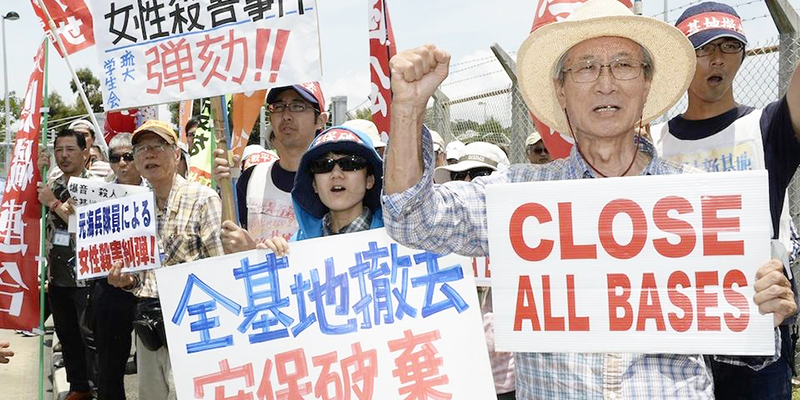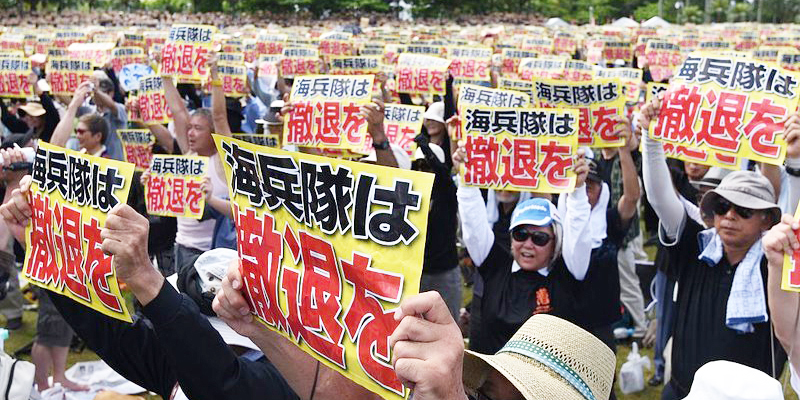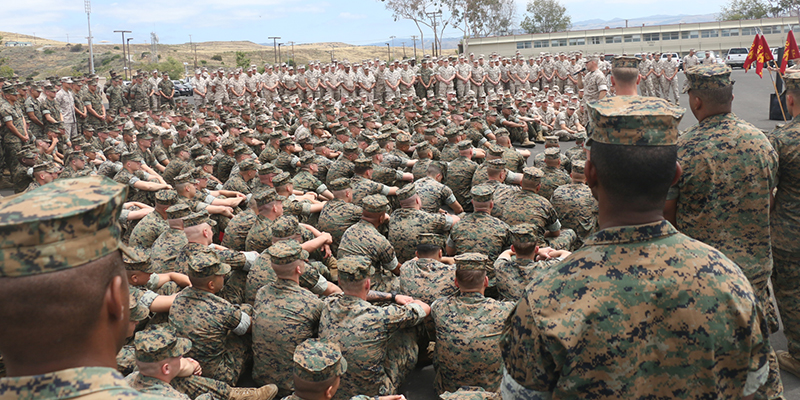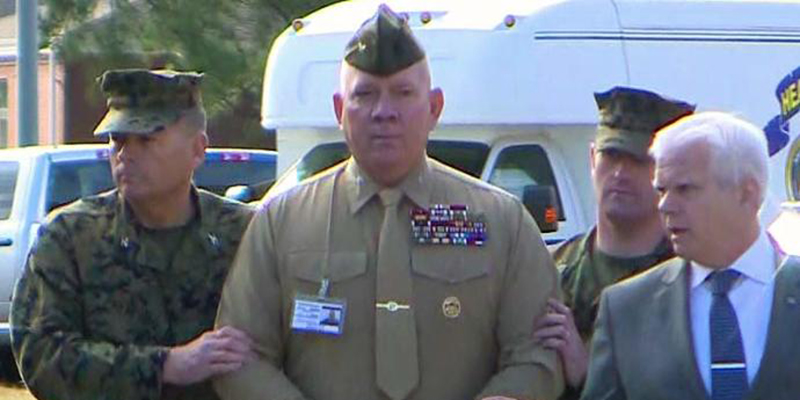
Seventy-seven (77) years ago America and Japan crossed swords that cost the lives of thousands of people. Now, Japan is one of the few friends America has left in the world, but there is trouble brewing. Over many years, some of our military members have committed heinous crimes against Japanese civilians that were routinely covered up by senior American military commanders.
To appease the Japanese, the Naval Criminal Investigative Service (NCIS) has aggressively set up sting operations to ensnare military personnel and deliver their heads on a platter to appease and calm the Japanese. American policy makers in Washington hope a high conviction rate will help keep American military bases on Okinawa. The problem with sting operations is that many times they result in the illegal act of entrapment. Entrapment is the act of government agents that induces a person to commit a crime that he or she is not previously disposed to commit.
Reporter Jon Mitchell wrote a great article for the Japan Times addressing the entire issue…
Pedophile Sting Operations Roil U.S. Forces on Okinawa
Controversial operations in which sailors pose online as
underage girls lead to dozens of NCIS arrests
 Since 2015, at least 36 U.S. service members on Okinawa have been arrested in child sex stings operated by the Naval Criminal Investigative Service.
Since 2015, at least 36 U.S. service members on Okinawa have been arrested in child sex stings operated by the Naval Criminal Investigative Service.
Those detained have belonged to all branches of the military — with marines in the majority — and their ranks have ranged from private to lieutenant colonel. Typically they have received sentences of between two and three years in military prison, and upon their release they will be required to register as sex offenders in the United States.
Details of the operations were revealed by two American lawyers — Timothy J. Bilecki and Stephen H. Carpenter Jr. — who have represented some of those service members arrested. Both lawyers have criticized the methods employed by the U.S. Navy’s law enforcement agency.
According to Honolulu-based Bilecki, in the operations, NCIS agents task female sailors with posting messages online, including in the personals section of Craigslist and on the Whisper messaging app. After being contacted by service members, the sailors pose as bored young women, engage in sexually provocative chat and, at some point during the conversations, they describe their ages as 14 or 15 years old. NCIS agents arrest the service members when they go to meet the females in person — either at a house temporarily leased to the NCIS within Kadena Air Base or an ice cream shop in American Village, a popular tourist area in Chatan Town.
The operations have been nicknamed “To Catch A Predator” due to their similarities to the contentious NBC reality TV show that aired from 2004 to 2007.
Basing his estimates on U.S. Marine Corps records, Bilecki says the Okinawa operations have netted at least 36 service members, but he believes the actual number may be as high as 50.
According to its website, the NCIS is comprised of more than 2,300 members in approximately 40 countries tasked with investigating major criminal cases involving or targeting the U.S. Navy and Marine Corps. Its special agents can conduct arrests of service members and civilians on- and off-base. In Japan, the NCIS is headquartered at Yokosuka Naval Base, Kanagawa Prefecture, with four subordinate offices, including one at Camp Foster, Okinawa, from where it is believed the sting operations are directed.

Bilecki is highly critical of the way the NCIS conducts the operations. He says following the arrests, NCIS agents dupe the suspects into writing letters of apology to the nonexistent girl’s mother. He also questions why the NCIS sends photographs of adult women to the service members when encouraging them to meet.
“NCIS is using the wrong bait. If they are really looking for pedophiles, then why don’t they send pictures of kids?” he said in a recent interview.
Highlighting the NCIS’s mishandling of the operations, explains Bilecki, is one case tried in March 2016. Following the arrest of a marine staff sergeant, he says, the female sailor playing the role of the young girl gave the suspect her real mobile telephone number and later engaged in sexual relations with him. According to Bilecki, the sailor was consequently removed from her position.
The Marine ultimately received a sentence of 15 years in prison — partly due to his sexual relationship with a real high school girl, which was uncovered during the investigation. The final sentence was reduced to two years because of a pre-trial agreement.
Seattle-based lawyer Carpenter, who has represented one of the marines and advised others charged in the Okinawa sting, describes the operations as “a network of sophisticated law enforcement tricks.”
“These kids (service members) are bored — indeed the only outlet they have is the internet, which, for NCIS, is like shooting fish in a barrel, except for the fact that these young marines aren’t fish, they are human beings with families and friends,” he told The Japan Times.
The morality of the NCIS operations has sparked heated debate online. On June 25, 2016, Bilecki posted a video on his law firm’s Facebook page following his successful defense of a marine accused of offenses including attempted sexual assault and abuse of a child. In the video — also viewable on YouTube (bit.ly/bileckisting) — he accused the NCIS of “absolutely entrapping people into committing crimes they wouldn’t otherwise commit.”
The Facebook posting has garnered 126,000 views and more than 530 comments. Although many people appeared to agree with Bilecki’s view that the NCIS operations were unjustly ensnaring service members, other posters seemed to support the operations. “Sting or not (the service members) are showing up to sleep with little girls! NCIS is protecting our alliance with Japan!” wrote one commentator.
Almost eight months since the video was posted, Bilecki remains outspoken in his criticism of the NCIS. These operations, he says, are being conducted “like an assembly line” with very little oversight. They are designed to boost arrest rates and make the NCIS look good, he says.
In recent years, there have been other high-profile arrests of American pedophiles on Okinawa.
In January 2015, a marine chief warrant officer admitted to 18 charges of sex crimes against children, some of which involved a child under the age of 12. He was sentenced to 144 years in military prison by a military judge at Camp Foster but the term was reduced to 20 years due to an agreement with the court.

In July 2015 a civilian employee at Kadena Air Force Base was convicted of sexually assaulting a minor on the base and filming the attack with his mobile phone. At a trial that took place in the U.S., he was sentenced to five years in prison.
Meanwhile, an undated case posted on the website of the Dallas-based law firm of Stephen P. Karns details how a first lieutenant in the army, stationed at Kadena, was arrested for possession of “983 image files and 41 multimedia (movie) files of suspected child pornography.” The soldier was allowed by his command to resign instead of facing a court martial, and it appears he did not receive any other punishments. Nor was he required to register as a sex offender.
“This high number of cases suggests there is a real problem with sex offenses in the U.S. military on Okinawa,” says Manabu Sato, a professor of political science at Okinawa International University. “Whenever there is an incident off-base involving a service member, the military likes to claim it is a one-off but these cases show such behavior is not an exception. If the military cannot even protect people within its bases then how can they claim to be able to prevent crimes from occurring off-base in Okinawan communities?”
On March 10, the first pretrial conference for Kenneth Franklin Shinzato is scheduled to be held at Naha District Court. The former U.S. Marine is charged with the rape and murder of a 20-year-old Okinawan woman in the city of Uruma last April. The crime ratcheted up anti-military tensions in the prefecture, host to the majority of U.S. installations in Japan.
The investigative machine that is NCIS continues to “cash-in” on sexual assault hysteria on Okinawa. Using deception, intimidation and lies, NCIS has created predatory investigators who frequently entrap our young military personnel. Military Appeals Courts have refused to even entertain that this is entrapment which is an illegal act by the government. When the government breaks the law, it’s no big deal. But, God help the young 19 year old sailor, soldier or Marine who falls into the NCIS web of deceit.
Presently there are twenty-three (23) U.S. Military bases in Japan, costing America billions of dollars. It’s time our good friend and ally assume the policing of the Western Pacific and our military comes home. We realize of course that our bases provide a very strong deterrent to potential aggressor nations in the region, but the Japanese can provide a formidable force as well. American needs to modernize it’s bridges, roads, schools, etc. Such and undertaking would cost trillions of dollars over the long term.
In 1945, America conquered Japan, then pumped billions of dollars back into Japan under the Marshall Plan. Partly because of American military protection, the Japanese have been able to rise up to one of the major economies in the world. There isn’t a home in America that does not have a multitude of items of Japanese origin.
If America really is a friend of Japan, and the Japanese asks American to go home, then we should honor their request and bring all military forces home. We understand there are many geopolitical forces at work that has kept us in Japan, but the time is right for us to respect Japanese sovereignty and gracefully return home.
The time is right for the Japanese to rev up their military to protect their own sovereignty and perhaps their neighbors as well. And the next time some crazy idiot fires a missile over Japan, there will be a swift and clear response. If a foreign nation fired a missile over America, we would immediately respond.
All nations of the world have a duty to keep the sea lanes free for commercial traffic and trade. If one or more nations decide to strangle trade by commerce raiding on the high seas, then all nations of the world must rise up to confront such aggression. Unfortunately, all the nations of the world have relied on the American Navy to take care of that for them.
It’s time for the America to render a farewell salute, and the Japanese to render a goodbye bow. Departing from Japan will help to put an end to the last remnants of World War II.



